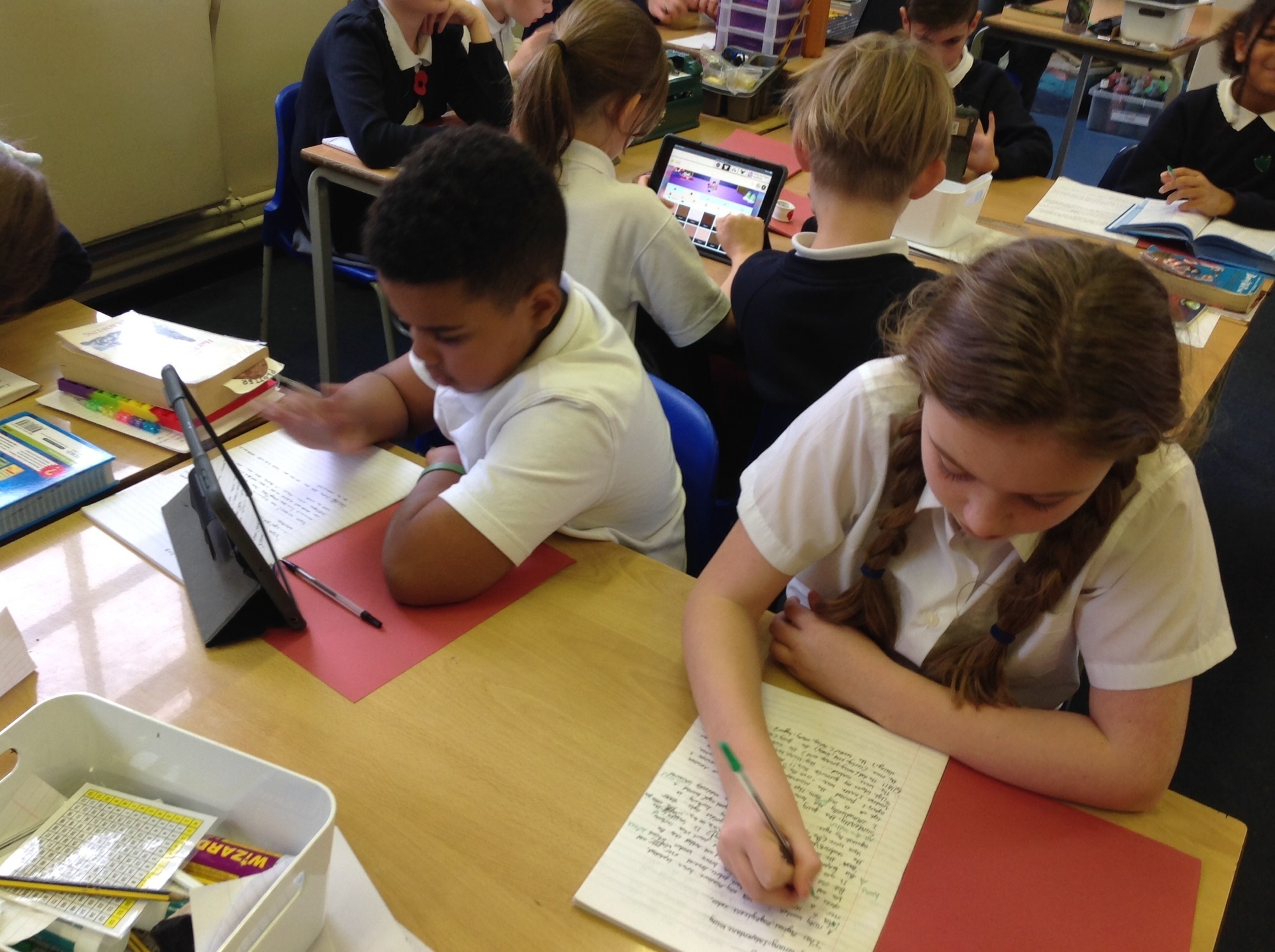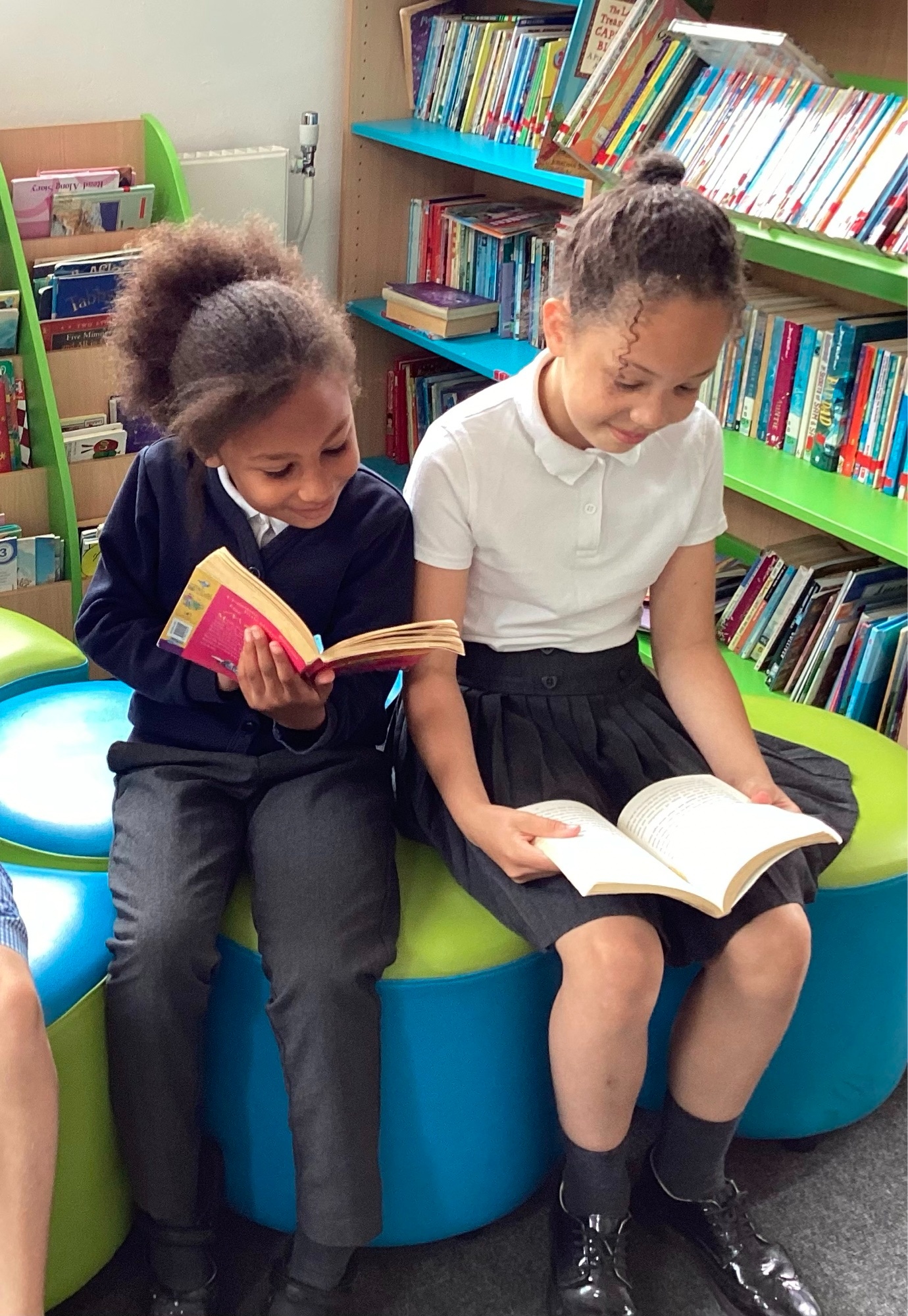English
Writing at Fawbert and Barnard’s
Intent
At Fawbert and Barnard’s, we know writing is an essential life-skill. Our aim is to develop transferrable writing skills that we build upon each year to create children who are confident in communicating knowledge, ideas and emotions through writing. We want to expand pupils’ vocabulary and understanding of language to provide the best outcomes for every child. We believe in setting the foundations for their future and enabling them continue to be independent life-long learners.
Implementation
 Writing begins in EYFS where children build their fine and gross motor skills. These skills are crucial to support them in their future as writers. We develop their vocabulary through building their knowledge of stories and poems.
Writing begins in EYFS where children build their fine and gross motor skills. These skills are crucial to support them in their future as writers. We develop their vocabulary through building their knowledge of stories and poems.
Writing at Fawbert and Barnard’s is cross-curricular. Although we have English sessions every day, in KS1 and KS2, we have high expectations for writing across the curriculum and the children will have many opportunities to refine their writing fluency. We take a mastery approach to writing and ensure all children are able to succeed.
At Fawbert and Barnard’s all teachers follow a sequence of planning to create clear and consistency learning journeys for the children. Our sequence supports metacognitive learning and allows the children to become more independent in their approach to learning. This is reflective of our belief that children should be taught to be life-long learners. We always begin our sequence by creating an engaging starting point, we move on to immersing the children in high quality writing and texts and this leads to developing and refining grammar, punctuation and spelling. The children will have the opportunity to stimulate and build upon their own ideas as well as implementing ideas from high quality texts. At Fawbert and Barnard’s we believe independence in writing is essential and scaffold children’s learning through teacher modelling, shared writes and plenty of opportunities to interact in learning before giving them plenty of time to create their own independent writing.
We use the Teach Handwriting scheme throughout KS1 and KS2.
We use No-Nonsense spelling to support our teaching of spelling across KS1 and KS2.
Impact
We are responsive to the needs of the children at Fawbert and Barnard’s. Therefore, teachers are constantly assessing the needs of the children and will adapt lessons accordingly. We use questioning as a tool to gauge where children are at, and all teachers are trained in using hinge questions to support planning next steps. Every half-term children are given the opportunity to carry out a warm-task, this allows them to independently write a genre of text they will have learned in the previous term. Not only does this support recall for the children, but it provides ongoing assessment opportunities for the teacher.
In English, we formally assess the children, every term, against our KAS grid which sets the KPIs for each year group (these are available to view on the website). This document sets out what the children will be assessed on termly. We upload data using FFT Aspire. This allows us to track children’s progress and ensure that we implement any interventions to support children to promote good outcomes.
We work alongside all schools in our academy to moderate our writing.
Reading at Fawbert and Barnard’s
Intent
Reading is key to our ethos of “Learning for life”; children will develop reading skills that will enable them to access all areas of the curriculum as they journey through the school as well as providing them with transferable skills for the future. At Fawbert and Barnard’s we aim to nurture well-read, knowledgeable and thoughtful readers. We promote a positive attitude and encourage enthusiasm towards reading. Reading for purpose and pleasure is at the heart of our reading provision across the school.
Implementation
EYFS and KS1
In EYFS children develop reading skills through shared reading with an adult and discussing what they have read. This could be in small groups or as a whole class. They also read individually with an adult twice each week in order to practise word reading and comprehension skills. As in all stages of the school, we encourage reading at home daily with books matched closely to the child’s phonic knowledge.
In KS1 children develop reading skills through whole class comprehension two to three times each week, as well as individual reading with an adult for focused groups of children. This provision gives children opportunities to read aloud in front of their peers, read with a partner or read individually with an adult. The sessions focus on key comprehension skills, fluency and application of phonics.
Phonics
At Fawbert and Barnard’s we are currently moving over to the Essential Letters and Sounds (ELS), systematic synthetic phonics (SSP). ELS is closely linked to our previous approach using Letters and Sounds. This will be rolled out in January 2022 with full training given to all staff. It is a validated scheme by the DfE. Reception and Year 1 will continue to take part in daily phonics sessions. The children’s reading books are closely matched to their phonics knowledge. Interventions are in place for children who have not secure in synthetic phonics by the end of Year 2.
KS2
In KS2, children have the opportunity to use Lexia as a tool to develop their reading skills either in Year 3 and 4 or Year 4 and 5. Lexia is used on a daily basis. It creates a focused curriculum for each individual child. It works on their areas of development as well as their strengths. It covers many aspects of the English and reading curriculum.
From Y2 whole class comprehension sessions are delivered once a week along with individual reading with an adult for focused groups of children. The sessions focus on key comprehension skills, fluency and word reading skills.
 Each class has a reading book which is read at the end of the day. These books are carefully chosen to expose children to a rich vocabulary and to allow all children to enjoy books beyond their own reading ability. It is one way we model our enthusiasm for reading and for books.
Each class has a reading book which is read at the end of the day. These books are carefully chosen to expose children to a rich vocabulary and to allow all children to enjoy books beyond their own reading ability. It is one way we model our enthusiasm for reading and for books.
Impact
As with all lessons, teachers use ongoing assessment and questioning to move learning forward. Lexia also allows teachers to monitor and put interventions in place to support each child.
Children are given a banded book to take home, this is a book suitable to their current ability, as well as having an independent choice of book to read. Books bands provide a clear progression in reading for the children but also allow for a variety of texts to be shared with pupils.
Termly teacher assessments against the reading KPIs will also inform about the learning and support teachers in meeting the needs of all children. As with writing, reading is formally assessed termly and this is uploaded to FFT Aspire. The reading KPIs are what will be assessed. Teachers monitor KPI progress through an assessment grid which is used to inform all teaching for both independent and class reading.

